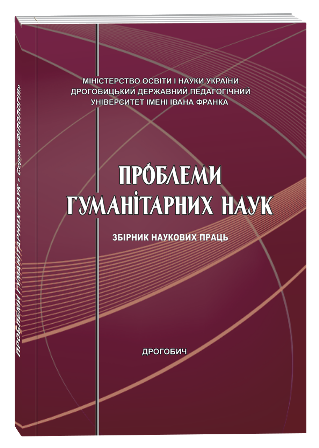THE STRATEGY OF THE BEHAVIOR OF WRITERS IN THE COURSE OF PERIODS OF CREATIVITY RESTRICTIONS (ACCORDING TO THE “DIARY” BY OLES HONCHAR)
DOI:
https://doi.org/10.24919/2522-4565.2023.58.5Keywords:
Oles' Honchar, The Diary, the terror, creative restrictions, censorship, creative experienceAbstract
This article puts its emphasis on the examination of the peculiarities of the behavior of Ukrainian leading writers within the period from 1920 to 1990, highlighting the outstanding features of the creative process of that period. It is possible to identify several time segments with particular common features within the indicated period. It is undoubtful that Oles' Honchar was affected by the absence of creative freedom and this fact was stated in his "Diary" on numerous occasions. Oles' Honchar performed the analysis of various degrees of ideological pressure on his creation process as well as its various forms, on the example of the authors who crossed their paths with the creative path of Oles' Honchar and comparing to the authors, whose behavior was firmly installed in the memory of the creative community of writers. The sense of terror became the dominant feature that defined the creative intentions of authors. There is the possibility of distinguishing the not numerous groups of creators, who explicitly collaborated with the authorities and were a significant factor of influence on the community of writers, whose ultimate objective was threatening and enclosing the creators on the limitations imposed by the supreme communist party. One has the possibility to emphasize the most friendly attitude of Oles' Honchar towards the writers of the older generation, which included Oleksandr Dovzhenko, Yuriy Yanovskyi, and Pavlo Tychyna. Creators, whose creativity is restricted by narrow social regulations, undergo a complex array of internal and external tormentings, which is familiar to the author of the "Diary". Oles' Honchar manifests a significantly more moderate degree of friendliness in his attitude towards the group of "sixtiers", especially towards – Vasyl' Stus, whose uncompromising creative agenda set inaccessible moral and ethical standards for Oles' Honchar. Personal experience of the creative activity of the author is affected not only by creative factors but also by his civil service, his activities in the communist party, and his administrative responsibilities. The above-mentioned factors are not to be interpreted superficially, however, they clearly demonstrate the influence of the ideology on the creative process of the author without any exceptions. Apparently, several factors proved themselves to be defining in the creative activity of Oles’ Honchar as a writer. Firstly the Holodomor (the artificially organised starvation), that Honchar had to experience in his native village in the Poltava region in the course of his adolescence period. The second factor was the repressions, that took place in year 1937, which were discovered by Honchar with the help of archived documents and personal testimonies of several writers, who had witnessed these events. The third factor was the experience of being in German captivity in the period of World War II. Each one of the above-mentioned traumatic events was the element of his internal terror, which could be leveraged by the leaders of the communist party on the highest level and at any moment. One of the most detailed testimonies by Oles' Honchar was about the period of repressions against him due to the fact of creation of his "The Cathedral" novel. With the objective of pleasing the expectations of the communist party leaders, Oles' Honchar was forced to alter the great amount of his works. The last years of the life of the author were not shackled by the regulation of Soviet ideology, thus the writer devoted himself to the restoration of the initial content of his works and even insisted on the prohibition of publishing of his works, which were affected by the forceful imposition of the Soviet ideology as the result of censorship and criticism. It is noted, that the array of methods of restrictions of the creative process and creative pressure, personally experienced by Honchar, includes the access of censorship to the process of editing the works of the authors, formation of editorial pre-arranged plans, as well as the rejection of drafts without the right of altering them. The methods of pressure on the writers additionally included the exclusion of the authors from the Ukrainian Association of Writers, the prohibition of working in publishing houses emitting literal magazines and newspapers, encouragement of defamation, suspiciousness, as well as physical and moral abuse often led to the acquisition of mental disorders and death of the authors. The safest conclusion here is that the amount of pressure on the creative freedom of writers depended on social factors that dominated within some particular period, and this practice was common and diverse.
References
Гончар О. Щоденники : В 3-х т. : Т. 1 (1943–1967) / упоряд., підгот. текстів, ілюстр. матеріалу та передм. В. Д. Гончар ; [худож. оформ. М. С. Пшінки]. 2-ге вид., випр. Київ : Веселка, 2008. 455 с.
Гончар О. Щоденники: В 3-х т. : Т. 2 (1968–1983) / упоряд., підгот. текстів, ілюстр. матеріалу В. Д. Гончар ; [худож. оформ. М. С. Пшінки]. 2-ге вид., випр. Київ : Веселка, 2008. 607 с.
Гончар О. Щоденники: В 3-х т. : Т. 3 (1984–1995) / упоряд., підгот. текстів, ілюстр. матеріалу В. Д. Гончар ; [худож. оформ. М. С. Пшінки]. 2-ге вид., випр. Київ : Веселка, 2008. 648 с.
Рарицький О. А. Партитури тексту і духу (Художньо-документальна проза українських шістдесятників). Київ : Смолоскип, 2016. 488 с.
Рева І. Р. По той бік себе : соціально-психологічні та культурні наслідки Голодомору і сталінських репресій. 2-ге вид., перероб. і доп. Київ : К.І.С., 2019. 272 с.



